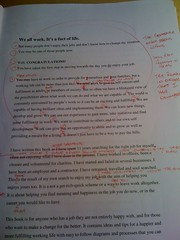Late last year, I was doing a quick/final once-over of a manuscript. I decided to see how many times I used “just.” The answer was around 300, or about once per page. I went through most of the manuscript and cut out about 90 of them.
 Proud of myself for making that effort, I tweeted about it (naturally). An author friend responded that she had cut 242 justs from her manuscript the week before. (Granted, she was editing one of her early manuscripts, so I have no idea how many she started with.)
Proud of myself for making that effort, I tweeted about it (naturally). An author friend responded that she had cut 242 justs from her manuscript the week before. (Granted, she was editing one of her early manuscripts, so I have no idea how many she started with.)
I had a momentary panic. Yes, this manuscript had been accepted for publication already, but did I need to delete the rest of my justs?
And justs are just one of this variety of word that pretty much everyone uses—and overuses—because it’s so common in speech. But in most writing, these words are pretty empty, almost like throat clearing. (I’ve committed a few of these “sins” in here. Catch them?) A few favorites:
|
|
But if they’re so awfully awful, why don’t we just cut all of them all out? It would certainly be even easier that way (though there would be a number of really odd gaps leftover). Or, conversely, do we argue that we want our writing to reflect how people really speak?
I think the answer is somewhere in between. As Arthur Plotnik says in Spunk & Bite,
Just because intensifiers course through informal speech, must we also use them in journalism and literature? Not necessarily—but we certainly can use them in situations where they feel natural, or communicate a particular tone. At the very least, we should not hamstring our writing styles trying to replace each intensifier with a more powerful locution. (123)
What does that mean? Don’t solve underwriting by overwriting every use. Because how is that any better?
So what should we do? Honestly, I’m not going to say you have to eliminate 50% of all your intensifiers (or de-intensifiers as the case may be). I do think we should be aware of how often we use them—so pull out the Find function and get a count. (In Word 2007 and up, if you Highlight All or use the Reading Highlight function, it gives you a count. Select Whole Words Only, though! Just != justice, justified, etc. etc.)
 If the count is fairly high—let’s say one use for every two pages (or more frequently)—start at the beginning and check out how you used it. Take the word out of the sentence. It
If the count is fairly high—let’s say one use for every two pages (or more frequently)—start at the beginning and check out how you used it. Take the word out of the sentence. It will probably may lose a shade of meaning—but is that meaning really necessary? Does it actually change the sense of the sentence or even the voice in a bad way? If not, finally cut it.
Editor Alicia Rasley gives more guidelines in an edittorrent post that has stuck with me for almost 3 years:
Of course, sometimes it works to over-modify (especially for comic effect). But this is something to watch for. “An inch below the bottom of her skirt” is a good description. “A little bit more than an inch” makes me envision some nun with a ruler measuring the space. Precision is actually distracting sometimes.
And especially watch out for redundancy. Mountains are high, but some are higher than others, so maybe we will allow “high mountains” (I did grow up in a valley below some not very high mountains, I guess– 3000-4000 feet, so I’d allow “high mountains” if you’re talking about the Rockies, say). But “toweringly high?” Come on.
But if the specific meaning is necessary, if the sense of the sentence is damaged or if the voice breaks because you took the word out, leave it in. If the modifier you’re checking is vital to most of the occurrences you find, use your judgment about whether you need to check the rest. Yep, you can stop. You have my permission.
What do you think? When do you take out intensifiers—and when do you leave them in?
Picture credits: Edit Ruthlessly by Dan Patterson; ruthless editing by Joanna Penn
 Thee problem is this: there’s only a handful of words in the English language to express those actions: smile, beam, grin, smirk, simper. Nodding is even worse: nod. Other versions of this one tend to draw attention to the words instead of showing the characters’ actions: bobbed his head (“up and down,” if you want to make it even more annoying).
Thee problem is this: there’s only a handful of words in the English language to express those actions: smile, beam, grin, smirk, simper. Nodding is even worse: nod. Other versions of this one tend to draw attention to the words instead of showing the characters’ actions: bobbed his head (“up and down,” if you want to make it even more annoying).  And do they need the forbidden modifier? I think so. Can you infer the meaning of his grin with just “He smiled at her”? (I have two images in mind here: “He smiled at her. Mmm. Lunch.” and “He smiled at her. Oh, a friend.”) A thumb chewer may be a small child seeking comfort, an adult pondering a problem or a guy with a nervous habit.
And do they need the forbidden modifier? I think so. Can you infer the meaning of his grin with just “He smiled at her”? (I have two images in mind here: “He smiled at her. Mmm. Lunch.” and “He smiled at her. Oh, a friend.”) A thumb chewer may be a small child seeking comfort, an adult pondering a problem or a guy with a nervous habit. Contrary to popular thought, not all action verbs are strong verbs. In the sentence “Ali walked down the road,” “walked” is an action verb. It is also a generic verb. It tells us that Ali is using her feet to advance across a surface and nothing else.
Contrary to popular thought, not all action verbs are strong verbs. In the sentence “Ali walked down the road,” “walked” is an action verb. It is also a generic verb. It tells us that Ali is using her feet to advance across a surface and nothing else.  Consider this sentence: “Sari’s words caused Anthony great confusion.” The sentence is grammatically correct. Moreover, its meaning is clear. But how much more vivid and exact is the revised sentence “Sari’s words confused Anthony”? Or even better, “Sari’s words baffled Anthony.”
Consider this sentence: “Sari’s words caused Anthony great confusion.” The sentence is grammatically correct. Moreover, its meaning is clear. But how much more vivid and exact is the revised sentence “Sari’s words confused Anthony”? Or even better, “Sari’s words baffled Anthony.” 